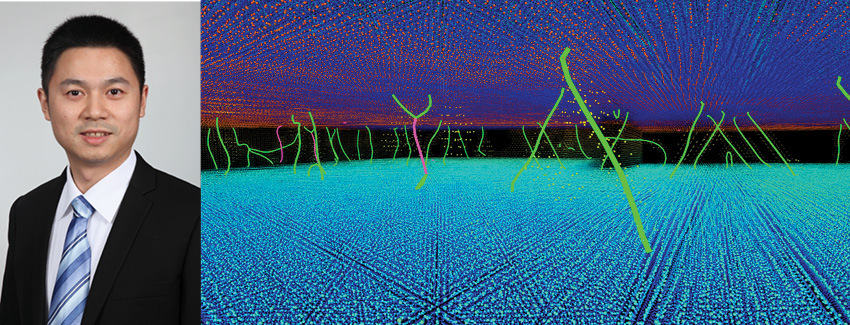By Leigh Thomas | April 1, 2020
Caizhi Zhou, an associate professor in the Department of Mechanical Engineering, is studying advanced structural materials in an effort to develop superior material properties that will be able to withstand harsher environments and result in greater production efficiency for a number of industries.
For instance, gas turbines are used to produce power. This occurs when hot gas enters the turbine blades and the turbine rotates and drives the generator. However, the temperature of the gas causes fatigue of the turbine blades and material degradation over time. The materials Zhou hopes to design will be fatigue-resistant and withstand much higher temperatures, resulting in higher turbine efficiency. This, in turn, will save billions of dollars in fuel economy, according to Jamil Khan, professor and chair of the Department of Mechanical Engineering.
Zhou’s research focuses on understanding the fundamental strengthening, deformation and failure mechanisms of structural materials. Specifically, the materials Zhou is studying are metallic nanolayered composites, a special class of metallic composite materials with ultra-fine layer thicknesses that impart unique behavior. They exhibit large increases in strength compared to larger-scale bulk constituents. This increased strength can lead to higher performance levels and energy efficiency not achievable with other materials, such as increased ductility, high radiation damage tolerance, shock resistance and thermal stability.
However, Zhou notes, “A lack of understanding of the mechanisms that control the properties of metallic nanolayered composites currently limits our ability to tailor them.”
To better understand these mechanisms, Zhou will analyze the influence of dislocation-interface interactions on the strength and instability of the materials. He hopes to identify the role of interface structure and material properties during the bonding process and uncover the microscopic mechanisms for the deformation behavior of the metals. This research will help provide guidelines for the design of materials with exceptional controllable properties, such as harder surface and the ability to withstand higher temperatures. Zhou said, “This gives these materials great potential for application in a variety of fields, such as aerospace and electronic devices, and thus a significant economic impact.”
Zhou will create these materials by computationally analyzing their behavior at all three length-scale levels: molecular, intermediate and macro-level. The scale levels allow researchers to model materials and study them from various magnitudes—from the molecular level to macro scale. Khan said, “Not many people have the expertise to numerically model all three levels of the length scale, but that is Zhou’s specialty. He can couple the scale models and design these new materials.”
Zhou’s research is supported by a prestigious CAREER Award from the National Science Foundation.
Khan explains that another significant area of Zhou’s research involves the integration of his models with machine learning and artificial intelligence in order to enhance the overall relevance of the models.
Zhou joined the faculty of the College of Engineering and Computing on Jan. 1. Khan explains that he fills a need on the college’s faculty for a researcher who studies all length-scale levels—molecular, intermediate and macro. Zhou, in turn, found the college’s experimental facilities to be advantageous to his research. He was previously a member of the faculty of Missouri University of Science and Technology for six years.
